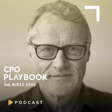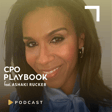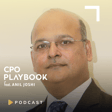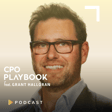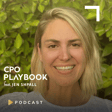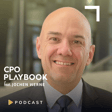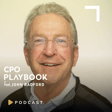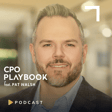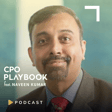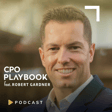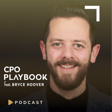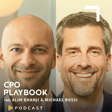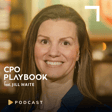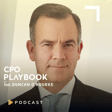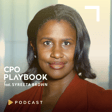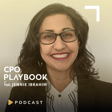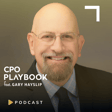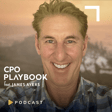Introduction to CPO Playbook Podcast
00:00:01
Speaker
I'm Felicia Shakiba, and this is CPO Playbook, where we solve a business challenge in every episode.
Transforming Organizational Culture
00:00:14
Speaker
It can take up to a year to several years for a Chief People Officer and Chief Executive Officer to successfully transform a culture. The collaboration between Chief People Officers and CEOs represents a critical aspect of organizational success, yet the severity of the problem lies in the gaps in understanding between these two roles. Many CEOs and executive leaders still view HR functions primarily through an administrative lens.
00:00:42
Speaker
This misalignment not only hinders the optimization of talent, but also contributes to the undervaluation of HR professionals exemplified by disparities in compensation compared to other executive roles.
Guest Introduction: Alex Seiler
00:00:56
Speaker
Bridging this communication and perception gap is essential for fostering robust and collaborative leadership dynamics that drive sustained success.
00:01:05
Speaker
Today's guest, Alex Seiler, former chief people officer, startup advisor, and senior faculty of the Josh Berson Academy.
00:01:15
Speaker
Alex, it's a pleasure to have you here today. Thank you for joining us. Thank you for having me, Felicia.
CEO Expectations vs. CPO Reality
00:01:20
Speaker
During an interview, CEOs express what they're looking for in a chief people officer. Do you find that stands the test of time once you're in the role? I think it's a yes and no, to be honest. I think it very much depends on the CEO. I think they have an idea of what they want.
00:01:40
Speaker
But it's not until you are dealing with real-time business challenges that it becomes clear how the CEO and CPO will and do work together. In my experience, I've worked with some CEOs who've previously had what I call, yes, HR leaders who were highly operational and didn't push back.
00:02:03
Speaker
And because I'm not that person, I'm a business and talent focused CPO who holds myself and others accountable. I think that's a real adjustment to CEOs who aren't used to that.
CEO Readiness for Change
00:02:16
Speaker
It really has a lot to do with where they've come from, what has been their experience in working with a chief people officer, and what are they ready for in terms of who they're going to be working with in the future.
00:02:29
Speaker
So there's a lot of variables to that, but I think one of the most important things that I've noticed is the push and pull, as I like to say. It's not until you're in it with a CEO that you really understand how much change they are ready and comfortable with. And you have to assess that on a case by case basis. And also know that when you push them, if they are
00:02:57
Speaker
picking up on what you're putting down, then you can move forward. If you've said something a few times and they're not picking up on it or even resisting it, it's time to walk away from that conversation because you're probably just going to end up irritating them at some point.
Building Trust in CPO-CEO Partnership
00:03:12
Speaker
You don't want to die on a ditch, so to speak, on every situation. You really want to pick your battles.
00:03:17
Speaker
I'd agree with that. I think that there's only so many questions you can ask in an interview, but really not be able to truly understand those behaviors until you're in it. And so establishing trust is incredibly key to any partnership. I think you and I can agree. Can you share some strategies or experiences where you've successfully built trust with CEOs and fostering that strong collaborative working relationship?
00:03:47
Speaker
Absolutely. I think that's one of the initial things that's always important. And I think it gets covered in an interview when you're interviewing with a CEO. But again, you really have to dissect it once you start working with a new CEO is talking about each other's working styles and what resonates with each of you so that there's some give and take in the relationship. Because obviously, all our working styles are different and you've got to give a little to get a little, so to speak, right? So that's one thing.
00:04:17
Speaker
I always find that establishing some quick wins, so to speak, and addressing some low-hanging fruit is a great start.
Managing CEO Egos and Leadership Dynamics
00:04:25
Speaker
It shows them that you're capable, you're listening, and it garners their respect as well. Another thing I say is, I think it doesn't hurt to have some ego stroking, but not ego feeding. And what I mean by that is,
00:04:41
Speaker
I think there are a lot of people who are like, it would be great if CEOs did not have egos. But to be honest, by the time you get to that level, you have had your ego stroke quite a bit. And so I don't think it hurts to do that. The difference with feeding somebody's ego is
00:04:58
Speaker
that you then become basically a yes person if you continue to do that. So stroking can mean agreeing with them on certain things, but it doesn't mean feeding them like basically a carpet that can be walked all over. So I also think that's an important point. And then the last thing I'd say on this is I talk about the fact that not all roads
00:05:20
Speaker
lead to CEOs. And what do I mean by that, especially since we're talking about a CPO relationship is that CEOs are getting a lot of information about a CPO from the rest of their leadership team. So it's really important that you're developing those individual relationships with the rest of the leadership team that rapport socializing ideas, because those people are also talking to the CEO about their relationship.
00:05:46
Speaker
with you all the time. And so that's also going to speak volumes because if CEOs have trust and they should and other members of their leadership team, that will in turn build trust with the CEO when it comes to your working relationship.
00:06:00
Speaker
I agree. I think sometimes people forget that everyone talks, everyone is in a room at some point one on one expressing how their relationships are going with their peers and so forth. So I think that was a really good call out.
Driving Success through Trust and Relationships
00:06:15
Speaker
And so once you've established trust, how does that impact the performance of the organization?
00:06:21
Speaker
I think how that impacts the performance of the organization is the fact that you're able to then, especially as I mentioned, if you're able to actually come up with those quick wins, is the fact that you're then allowed to do more. People, once they see you as capable in a CEO role, are willing to let go, right? They're willing to let you in. They're willing to share more. They're willing to become a little bit more vulnerable.
00:06:47
Speaker
And what that means is that they're also willing to potentially increase the scope of your responsibilities and all the type of work you do. I'll give you an example. In my last role, what attracted me to the role is that it was all about HR transformation, which
00:07:04
Speaker
is in my sweet spot and what I love to do. And while it was in an industry I never thought I'd work in, it was a role, it was a very innovative company in terms of what they were trying to do from a people perspective. And they were very honest with me in the interview process and said,
00:07:20
Speaker
We've never got the people function right and we need somebody that's going to guide us and steer the ship. That sense of being able to be empowered and to be an ultimate decision maker was really exciting to me. And I think one example of that was coming in and within 90 days coming up with a people transformation plan and then within
00:07:41
Speaker
180 days coming up with a people strategy, right? And I needed to give that time to, one, go on a listening tour and get an understanding of what was working or what wasn't working, because I believe that we can't move forward without learning what's happened in the past, right? Historical context is key. And also, you don't want to change everything because there might be some things that are working that you want to bring forward.
00:08:06
Speaker
And I've tended to find that executives that try to do too much to quickly get spat out of organizations as well. I think coming up with those benchmarks, doing those two things, and then starting to operationalize them really garnered the respect of the CEO and highlighted that I knew what I was doing. And also that I wasn't all words, I was also action, right?
Risks of Misalignment and Compensation Issues
00:08:31
Speaker
I will say though, just because
00:08:34
Speaker
On the flip side of this, because we're talking about trust, what can build distrust or where I think it can be a challenge sometimes in a CPO role is if you are misaligned with your CEO, where they have a different viewpoint.
00:08:49
Speaker
than you do and if that happens, if there is a fracture in the relationship, what can be damaging for the performance of the organization and the CPO role is that some CEOs can go rogue. They might start trying to figure out certain things themselves or situation or engaging other members of the executive team for people-related matters where that's not their sweet spot and they're not a subject matter expert.
00:09:14
Speaker
You really don't want to be in that situation. I think it's very important to hold a sort of healthy tension with your CEO as a CPO about that. If things aren't working, we need to have a very open, transparent narrative around it.
00:09:31
Speaker
I want to jump to compensation because navigating compensation challenges can be complex, especially when there's a recurring pattern of the chief people officer's compensation being notably lower than that of the other executive team members.
00:09:49
Speaker
So what factors do you believe contribute to this discrepancy? And how can organizations ensure equitable compensation for HR executives in comparison to their peers? It's a great question. I think the first thing that springs to mind when I hear this is maybe the lack of understanding of what a CPO truly does or is responsible for.
00:10:14
Speaker
I think it goes back to my other point that if they've only worked with operational HR leaders in the past who really haven't understood the business or have the business acumen and come up with the people strategy, they really don't understand what a strategic or talent CPO looks like, which means they don't know how to accommodate or pay them and incentivize them in the way they need to be incentivized. The other thing I would also say is more and more we're starting to see
00:10:43
Speaker
Chief People Officers or CHROs who are actually becoming CEOs. We've seen instances of that in places like MetLife, over time General Motors, I think a few different places to name them. And so my concern about this situation is if companies are gearing CPOs to potentially be CEOs,
00:11:02
Speaker
If they're underpaying them, there's going to be such a huge discrepancy in pay once they get to that role. You're undercutting their salaries just creates a far bigger problem for you if they are actually part of your succession model. Something I really don't understand as far as the approach. The other thing I'll say is
00:11:23
Speaker
A CPO will see the entire leadership team's compensation. So if they are bought in at the lowest, that already creates, and we've talked about trust, a question mark around the why and a potential divide. So it would behoove a CEO to bring that person in at fair market value to motivate them for the challenges ahead. And the other thing is, I think that hopefully
00:11:48
Speaker
The pandemic has taught a lot of CEOs how much achieved people often, the people function touch, right? It's pretty limitless at this stage for that to happen. As far as what I think must and needs to be happening is investing in market data. I sometimes think that people just put their finger in the air and say, maybe this sounds right or this would fit into our budget.
00:12:12
Speaker
That's not going to resonate with top talent, right? They need to be leaning on executive search firms as well for their inputs. I've heard a lot in the past from executive search firms saying, hey, we're really struggling with the client who's usually the CEO, compensation. They don't really want to pay what market
00:12:33
Speaker
And so that's a struggle that happens quite a bit. But at the end of the day, you get what you pay for and you're shortchanging yourself if you don't look at it in the right way. And then the last thing I'll say on this is a CPO might run or lead one function.
00:12:49
Speaker
but they are responsible for understanding the entire business in order to come up with the right people strategy at the right time for that business. And you need to pay for somebody who's actually going to be able to understand the breadth of that type of role as well.
00:13:05
Speaker
And on that note, because we've been talking about at market value, even the pay providers, the vendors who are providing the data around market value, I've seen it and the chief people officer or
00:13:21
Speaker
head of people rule is significantly lower at market value. So even if companies went to find out what that data was to say, we want to pay you at market value, that discrepancy, notably research-based, is wide.
00:13:38
Speaker
Yeah, and I think that's attributed to a few things, Felicia, if they're only using one data source. I think in this particular climate, you have to be using multiple data sources, right? And depending on the industry you're in, I have this conversation a lot, like some industries don't share much in the way of market data. And some people also will only pay, if I work in a professional services firm, I will only pay according to what other CPOs in professional services firms make. But you might be trying to attract somebody
00:14:07
Speaker
who most recently worked in tech, and that's not going to appeal to them, especially if the total compensation mix is different. So I think the problem lies in there's not enough data or different data sets being used. I don't think there's enough information being shared.
00:14:25
Speaker
And I also don't think it's real time enough. Some of these data sets, they only come out once a year or twice
CPOs Transitioning to CEOs
00:14:32
Speaker
a year. And that's just not good enough in this market at this point, right? As soon as it comes out, it's a ready aged data. So I think that's part of the problem. And I do think that you really have to look at some very different robust sources. And I don't think there's always that investment from certain companies to do that. I think there are.
00:14:52
Speaker
I'm not saying they don't exist, there are some out there, but by and large that's not happening.
00:14:57
Speaker
Yeah, and I think that if CEOs are truly committed to people's strategy, which essentially is their business, right? It's the people who make the product, it's the people who sell the product, it's the people who run the business in order for the product to get sold. And I can see how chief people officers can very well roll into the role of a CEO.
00:15:24
Speaker
with all of that knowledge. And I'm interested to see the future and how many CPOs actually turn that corner to become CEO in the future. I think it would be an interesting data to collect for 2024. Absolutely. And I've seen it. I see it more and more where I see companies actually putting business unit leaders
00:15:47
Speaker
into CPO roles to round them out in preparation for a CEO job. And I think that's really smart of companies that have won the means and the size and the revenue to do that, but it is setting themselves up for success because obviously from a business perspective, they've led a business, they've led a P&L, but now they also understand and surrounding themselves by other people, subject matter experts to get
00:16:13
Speaker
that level of that functional responsibility and expertise as well. I think it is really interesting. Another role that I personally find interesting and you see it at certain companies is a chief strategy officer role. That's also a place where CPOs can play because once you've created a people strategy,
00:16:32
Speaker
You can very much create the business strategy for a company as well. So I think there's many doors, many more than some people think for a CPO to go. And I think people that think more traditionally think that, hey, you're just going to end up moving to another CPO role at a bigger company with more revenue. And it doesn't need to be that. It's very much individualistic and it very much depends on what kind of CPO you are.
Ensuring CPO Empowerment and Support
00:16:55
Speaker
As a CPO, I know creating innovative, progressive workplace cultures is crucial to you and crucial to the business. How do you balance how much a CEO focuses on this versus yourself?
00:17:12
Speaker
Yeah, it's a great question. I think that for me, it's important that a CPO is allowed to feel, and it feels empowered in their job, right? And that they feel like they want
00:17:27
Speaker
that they have ultimate decision-making power. Now, I'm not saying that they don't want to collaborate. They want to collaborate with both the CEO and obviously the rest of the leadership team. But at the end of the day, they want to have the ultimate decision just like any other member of the leadership team would. So they're not unique and different in that way. I think for CEOs, it's going to be making sure they're visible and supportive.
00:17:51
Speaker
of any initiatives that a CPO is pushing out, even when they're not in the room. Speaking of those things, I'll give you a couple examples. I mean, diversity of DEI strategy is always important, right? You want somebody who actually walks the talk on DEI so that it doesn't come across as performative, right? Because you want to be able as a CPO to say, we don't just talk about these things, we actually do them, right? I think another thing
00:18:20
Speaker
that I did at my last company was create a huge investment in our health and well-being strategy because I realized that the employer-to-employee contribution that was being provided just wasn't where it needed to be. And so I used data, whether that's through exit interviews, whether that was through internal surveys.
00:18:40
Speaker
to make a basis for
Clarifying HR Responsibilities and Data Utilization
00:18:42
Speaker
that point. And that was where you get identity to tell you data makes a huge difference, right? People don't ignore data. They do ignore anecdotal information, but they definitely don't hide away or ignore data. And so that's really something I needed to highlight. And then the other thing I would say
00:19:02
Speaker
It's also shining a light on the things that the people function should be doing and should not be doing because sometimes I think we can become a dumping ground for things that nobody else wants to own or nobody wants to ask the question about. So making it clear what those things are and what they aren't. And so I think.
00:19:20
Speaker
that the support and the visibility of the CEO and obviously the Thor partnership is so critical and you move the needle through the combination of the understanding of the business and the data that you've provided behind it.
00:19:34
Speaker
Absolutely agree. I think every strategic successful CPO should be leveraging data for their initiatives. One thing I know that will speak to your heart from an HR tech perspective is my last company, I really came up with a new HR tech strategy that was focused on consolidation, simplification, because at the end of the day, we were using so many different systems, just so many different things.
00:19:57
Speaker
And the leadership team didn't really want to understand these systems or just allow those systems to be bought in because they thought it was the right thing to do based on feedback they received. So I think, again, it's educating your leadership team and your CEO so they understand why they're making certain decisions. And that's the difference in, I think, a CPO that's like bringing people along for the ride.
Advice for CEOs on Working with CPOs
00:20:21
Speaker
I want to ask one last question, which I think is a really important one. Because as CPOs, we interview CEOs constantly. What's the best piece of advice you could give them when thinking about how to harness an effective relationship with their CPO?
00:20:39
Speaker
So I think there's a couple of things I'd say. Firstly, focus on being a CEO and not wearing any other hats in the C-suite, right? And by that, I mean play to your strengths, which were you were hired as a CEO. So focus on very much doing that role to the best of your ability and hire the right people for other roles on the C-suite.
00:21:00
Speaker
And I say that because I've experienced CEOs playing the role also of COO and it doesn't necessarily work well because that skill set is so different and it becomes confusing for the leadership in terms of who to go to for what, where their strengths are, things of that nature. So I definitely say just focus on the one role because it's going to create confusion across the board. I'd say.
00:21:24
Speaker
Being comfortable saying you don't know what you don't know. I love working with CEOs who have a very pragmatic approach, saying, hey, this is my sweet spot. This is what I'm good at. You're here for a reason. I'm going to lean on you for that reason and acknowledge that they don't have all the answers. And we talked about ego before. You have to be willing to put some ego aside.
00:21:47
Speaker
to be willing to say that as well. I've mentioned it already, but empowering your CPO, you really hide as subject matter experts. So basically let them do their job. They want to collaborate, but they want to have ultimate decision-making authority like any other member of the team. And lastly, having that push-pull relationship isn't a bad thing. You have to be able to, I think it's really important to embrace healthy tension. You don't want to avoid it.
Conclusion and Call to Action
00:22:14
Speaker
Alex, thank you so much for being here. Thank you, Felicia. That's Alex Seiler, former chief people officer, startup advisor, and senior faculty at the Josh Berson Academy.
00:22:25
Speaker
If today's episode captured your interest, please consider sharing it with a friend or visit cpoplaybook.com to read the episode or learn more about leadership and talent management. We greatly appreciate your rating, review and support as a subscriber. I'm Felicia Shakiba. See you next Wednesday and thanks for listening.

